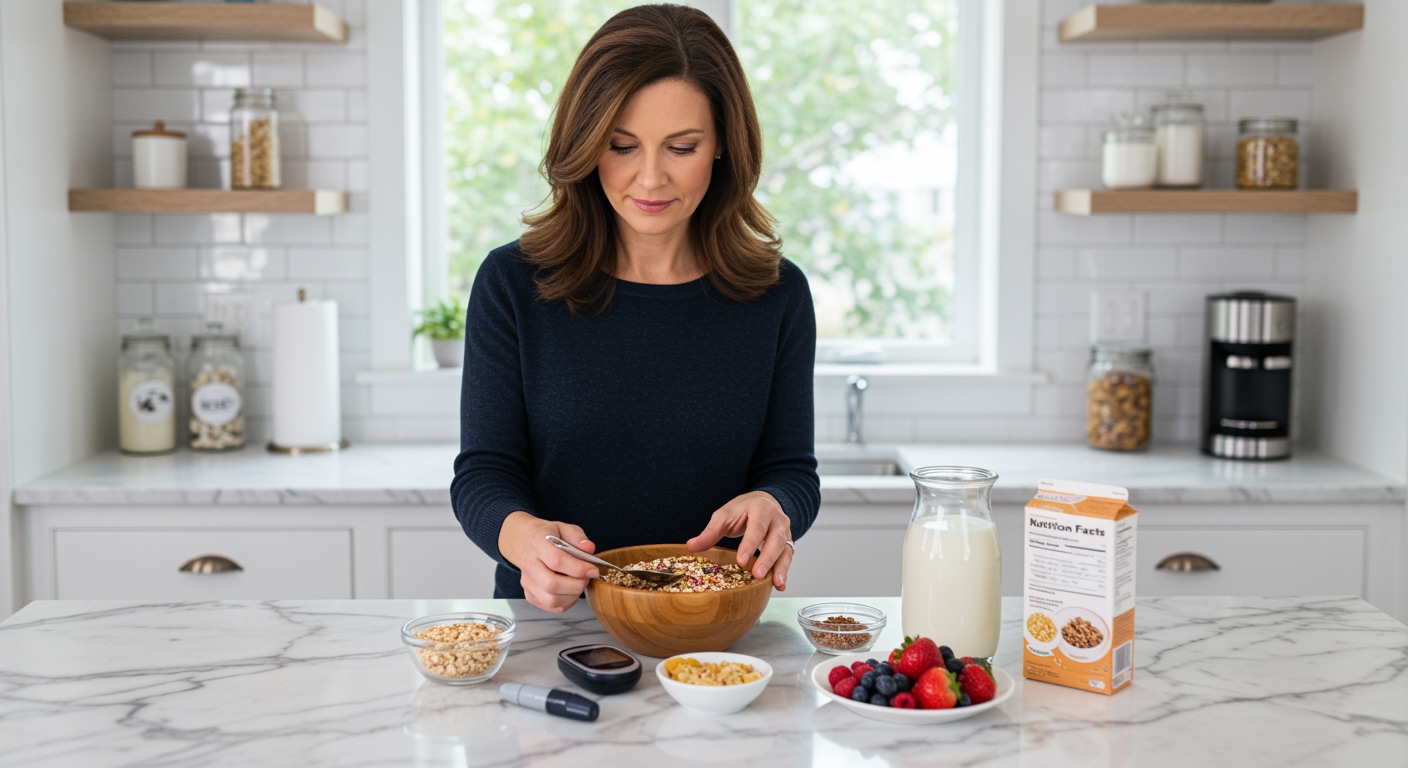✪ Key Takeaway: Muesli can be good for diabetes when chosen carefully, but many commercial varieties contain high sugar and can spike blood glucose levels.
Introduction
You grab that colorful box of muesli thinking you made the healthiest breakfast choice possible.
But then your blood sugar monitor shows numbers that make you question everything you thought you knew about this supposedly healthy breakfast option.
Hi, I’m Abdur, your nutrition coach and today I’m going to explain exactly how muesli affects your blood sugar and which types work best for diabetes management.
What Makes Muesli Different From Regular Cereal?
Muesli contains a mixture of rolled oats, nuts, seeds, and dried fruits that creates a complex nutritional profile.
Unlike processed cereals, traditional muesli provides fiber-rich whole grains that slow down sugar absorption in your bloodstream.
The protein from nuts and seeds helps stabilize blood glucose levels by reducing the speed at which carbohydrates enter your system.
However, many commercial muesli brands add extra sugars and sweeteners that can dramatically increase the glycemic impact.
The dried fruits naturally present in muesli contain concentrated sugars that affect blood glucose differently than fresh fruits.
✪ Pro Tip: Always check the ingredient list and choose muesli with no added sugars for better blood sugar control.
How Does Muesli Affect Your Blood Sugar?
The glycemic index of muesli ranges from 40 to 66 depending on the specific ingredients and preparation method.
Unsweetened muesli typically has a moderate glycemic index of around 40-50, which means it causes a slower rise in blood glucose.
The fiber content in oats forms a gel-like substance in your digestive system that slows carbohydrate absorption.
This mechanism helps prevent the sharp blood sugar spikes that often occur with refined breakfast cereals.
However, the portion size matters significantly because even healthy carbohydrates can raise blood glucose when consumed in large amounts.
Research shows that combining muesli with protein sources like Greek yogurt or milk can further reduce its glycemic impact.
✪ Fact: Beta-glucan fiber in oats can reduce post-meal blood sugar spikes by up to 30% compared to refined grains.
Which Type Of Muesli Works Best For Diabetes?
Unsweetened muesli with minimal dried fruit content provides the best blood sugar control for people with diabetes.
Look for varieties that contain whole grain oats as the primary ingredient rather than processed flakes or puffed grains.
The ideal muesli should have nuts and seeds that provide healthy fats and protein to slow glucose absorption.
Avoid muesli with added honey, sugar, or chocolate as these ingredients can cause rapid blood sugar increases.
Homemade muesli gives you complete control over ingredients and allows you to customize the recipe for your specific needs.
Consider adding fresh berries instead of dried fruits to reduce the overall sugar content while maintaining flavor and nutrition.
✪ Note: Soaking muesli overnight can lower its glycemic index by breaking down some starches before consumption.
What Is The Right Portion Size For Diabetics?
A proper serving size of muesli for diabetes management is 30-40 grams or about one-third cup of dry cereal.
This portion typically contains 15-20 grams of carbohydrates, which fits well within most diabetic meal plans.
Measuring your muesli with a kitchen scale provides more accuracy than using cups or visual estimates.
Pairing this portion with protein-rich foods like Greek yogurt or milk helps create a more balanced meal.
The combination of fiber, protein, and healthy fats in a properly portioned muesli meal can keep you satisfied for hours.
Monitor your blood glucose response to different portion sizes to find what works best for your individual needs.
✪ Pro Tip: Test your blood sugar 2 hours after eating muesli to understand your personal glucose response.
The Bottom Line
Muesli can be an excellent breakfast choice for people with diabetes when you choose unsweetened varieties and control your portions carefully.
The key to managing diabetes is not avoiding foods but understanding how they affect your body and making informed choices.
I would love to hear about your experience with muesli and diabetes management, so please share your thoughts or questions in the comments below.
References
At NutritionCrown, we use quality and credible sources to ensure our content is accurate and trustworthy. Below are the sources referenced in creating this article:
- PubMed: Glycemic index of foods: a physiological basis for carbohydrate exchange
- January AI: Muesli Glycemic Index
- Glycemic Index Net: Muesli Glycemic Index
- PubMed: Postprandial glucose response to cereal products





